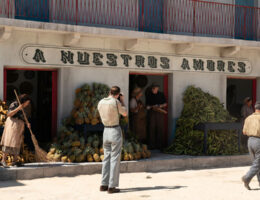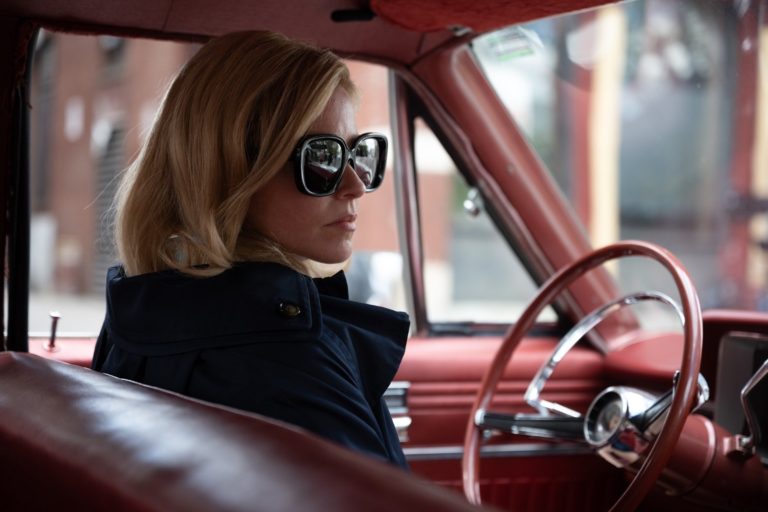Call Jane (2022 | USA | 121 minutes | Phyliss Nagy)
In her first feature as director, Carole screenwriter Phyliss Nagy, steps behind the camera and casts Elizabeth Banks in a melodrama about a Chicago housewife whose frustrated pursuit of a life-saving abortion leads her into the heart of a clandestine collective of women connecting those in need with vital services. Set in 1968, its occasionally valedictory tone also serves as an uncomfortable warning as near-daily headlines threaten for history to repeat itself.
As the film opens, we follow an elegantly dressed Elizabeth Banks (Joy) in heels and updone tresses, winding through an opulent Chicago hotel lobby where she’s accompanied her lawyer husband (Chris Messina, as Will) to a reception for new associates. Stepping briefly out her duties to make small talk with the other wives or oblige partners for dances, she encounters a line of young Chicago police officers preparing for combat with hordes of Yippie protestors amassing for the DNC. Their presence awakens her, ever so briefly, to the growing winds of change that are about to shake the country, but it’s only the beginning of her awakening. Soon, more urgent concerns will force the well-educated suburban housewife to see beyond her bubble of privilege.
At home, Joy and Will have a teenage daughter and are expecting another, but through attentive filmmaking and auditory cues Nagy makes it evident that this early pregnancy is already taking an unhealthy toll. After collapsing in the kitchen while dancing to her daughter’s Velvet Underground record, Joy learns that her pregnancy has induced cardiomyopathy that will almost certainly claim her life if brought to term. When batch of homemade cookies fail to convince a callous hospital board to grant their petition for “termination”, the rule-following criminal defense attorney husband is heartbroken, but seems to accept his wife’s grave fate. Joy, however, decides that she wants to live and attempts to avail herself of other avenues to end the pregnancy, from attempting to convince psychiatrists that she’s insane, considering a slip-and-fall down a staircase, and eventually visiting a grimy abortion provider on the wrong side of town. It’s there, in a surprise downpour, that Joy encounters a flyer for the Jane Collective, and the movie turns a dramatic corner.
Rather than letting the film wallow in grave tragedy, Nagy mixes the tones for each of these episodes. The psychiatric visits play like comedy, the staircase incident like a melodrama, and a trip to the bank to illicitly withdraw funds to cover the cost of a procedure like a heist film. When Joy finally calls “the Janes” for help in securing a safe abortion, the process of getting there plays out like spycraft, with secret meetings, blindfolds, and anxious handoffs. It’s only when it comes to ending her pregnancy that the filmmaking snaps back into cold reality, shot in garish green light and capturing each step of the procedure as administered by a competent provider whose cold bedside manner does little to comfort Banks’s visible fear. By not shying away from the details, Nagy shows that even these “best case scenario” abortions were still perilous affairs for the women who could afford them.
Still, it is the end of her pregnancy that literally gives Joy a new lease on life. In her immediate recovery, she meets the women of the collective (led by Sigourney Weaver, as the no-nonsense committed founder) and is spurred to become a part of their work. Telling her husband and daughter that she had a spontaneous miscarriage, she essentially disappears from her family life to throw herself into “art class”, and her involvement with the Janes becomes a tour of the various facets of their organization, the breadth of women involved, and the tough decisions that they face in deciding who to help while appeasing the mob and staying out of the spotlight.
The film asks a great deal from Elizabeth Banks and she delivers. Joy’s journey from sheltered housewife into the collective finds her first confronting her own biases and judgements, and later bristling against the power structures that limit the types of people that they’re able to help. A seeming desire to fit in all of the details from this real-life organization occasionally threaten to leave the film feeling rushed or shallow, but with so many good stories it’s hard to begrudge the filmmakers from glossing over some of the character development back at home to fit in a few more scenes of the Jane Collective struggling with issues of equity and race, Sigourney Weaver negotiating with their young capitalist abortionist over a game of truth or dare, and Elizabeth Banks portraying Joy’s remarkable evolution.
While the film elides, to a degree, the dangers lurking at the edges of their operation — from the police to the mafia to the acquisition of supplies and spaces — this narrative choice keeps an already busy film from getting bogged down and losing sight of its core issues. The amount of potential details suggests that this could’ve been a successful limited series, but I appreciate the choice to condense it into a stand-alone storyline. In particular, by empathetically depicting so many abortion procedures, Nagy also reinforces the wide variety of people whose needs were unmet by the medical and political establishment and the degree to which increasing commitment from the Janes, and Joy in particular, changed the experience of the women confronting this difficult choice. (For those seeking more detail, The Janes, plays in the festival’s documentary section and might provide a complimentary gap-filling perspective.)
To its credit, the film is never weighed down by its heavy material. It is sometimes a caper, sometimes comedic, occasionally a mystery, and ultimately a triumphant story of determination achieved by a strong cast of actors. If anything, it’s epilogue in the immediate aftermath of the Roe vs. Wade decision rings too unintentionally optimistic. As the women revel in their success of a landmark legal battle and consider the battles yet to come, it’s hard not to think about this film arriving a half-century later with those victories still in peril.
Call Jane premiered at the 2022 Sundance Film Festival on Friday; it has a second screening on Sunday and is still seeking distribution.




